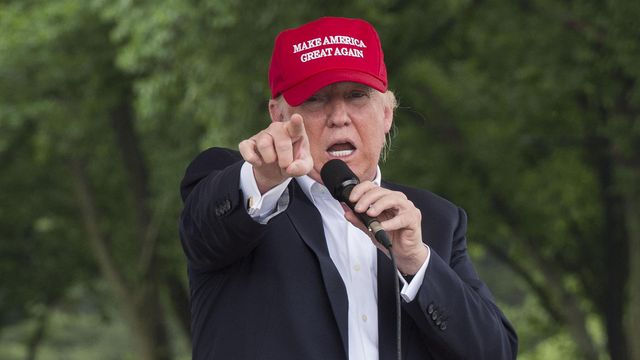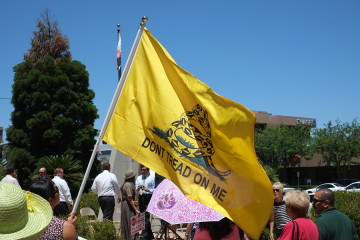Trump Stuns With Upset of Clinton, Political Establishment

(Bloomberg) —Donald Trump was elected the 45th president of the United States in a stunning repudiation of the political establishment that jolted financial markets and likely will reorder the nation’s priorities and fundamentally alter America’s relationship with the world.
The real-estate developer and reality-TV star, a Republican who has never held public office, defeated Democrat Hillary Clinton after a punishing campaign that exposed searing divides in the American public. Trump, 70, will have a Republican-controlled Congress to enact his agenda and the ability to appoint Supreme Court justices in the coming years.
With strong support from white, working-class voters, Trump was pushed over the 270 Electoral College votes needed by Wisconsin to become president-elect. When sworn in on Jan. 20, Trump will preside over a government he’s called corrupt and unworthy of trust.
“It’s time for America to bind the wounds of division,” Trump said as he addressed cheering supporters in Manhattan. “I pledge to every citizen of our land that I will be president for all Americans.”
Trump also addressed Clinton supporters, saying he was “reaching out to you for your guidance and your help so we can work together to unify our great country.”
Concession Call
Trump said Clinton called him early Wednesday to concede and he thanked her for her long history of public service. Her campaign chairman, John Podesta, told supporters at the Javits Center in Manhattan early Wednesday that she wouldn’t be addressing them until later in the day. A campaign aide said she’d speak in the morning.
President Barack Obama also called Trump, said the Republican’s campaign manager, Kellyanne Conway, according to NBC News.
In financial markets, turbulence calmed after a knee-jerk selloff in stocks and rally in haven assets as investors reassessed the effects of Trump’s surprise victory. After initially sliding the maximum allowed, futures on the S&P 500 Index pared losses along with European equities, while the yen and gold scaled back gains. Mexico’s peso led emerging-market currencies lower amid concern U.S. trade policies will become more protectionist.
Russian President Vladimir Putin in a telegram to Trump congratulated him and expressed “hope for joint efforts to bring Russian-American ties out of crisis, resolve key international questions and find an effective response to the challenges of global security,” the Kremlin said in an e-mailed statement.
Congressional Control
Republicans clinched at least 51 Senate seats after winning some of the tightest of 34 races. In the House, all 435 seats were on the ballot and Republicans were forecast to hold their majority, though with a slimmer margin.
Trump tallied victory after victory in Republican strongholds and crucial swing states including Florida, North Carolina, Iowa and Ohio. By Wednesday morning he had breached Clinton’s electoral firewall in the Rust Belt by winning Pennsylvania, a state that had been in the Democratic column since 1992. Wisconsin, the state that put him over the top, had not voted for the Republican presidential candidate since Ronald Reagan’s landslide in 1984.
Why ’swing states’ dominated the race: a QuickTake explainer
Trump won 63 percent of white men and 53 percent of white women, while Clinton won 74 percent of non-white voters, according to exit polls published by CNN. Trump carried a third of all Latino men and 26 percent of Latina women.
He also won 51 percent of voters with a high school education or less and 43 percent of those with a college degree. Clinton carried 52 percent of voters earning less than $50,000 a year, but lost to billionaire Trump among those in other income groups.
Initially dismissed as little more than an entertainer promoting his brand, Trump overcame a deficit in polls and public approval, deep ambivalence within the Republican Party and a campaign marred by controversies and stumbles that would have knocked any other candidate in any other year out of the race.
Savvy Showman
With a knack for making himself the center of the conversation — for good and for ill — the savvy showman in Trump pressed forward with a message that he could “make America great again.” That found resonance in a portion of the electorate anxious and angry about economic, cultural and social upheaval. His rhetoric on immigrants, Muslims and minority groups also energized fringe groups outside the political mainstream.
That he sometimes contradicted himself on positions, and that many of his statements were declared false by independent fact-checkers, didn’t seem to shake his core supporters. This infuriated Democrats who looked on spluttering and aghast as a man they considered little more than a bigoted charlatan always seemed to emerge unscathed.
Trump, a master marketer, apparently understood the political marketplace better than any pundit or pollster.
Deputy campaign manager David Bossie laid out Trump’s path to victory during a conference call with reporters on Nov. 1: win Florida, Iowa, North Carolina and Ohio, then carry one of the other states where he was competing hard, including Pennsylvania and Wisconsin. Trump did it.
Trump’s appeal was strong in blue-collar areas such as the Michigan county of Macomb, home of automotive plants and parts suppliers and mostly white union-member voters. They were the inspiration for the label “Reagan Democrats” who backed that entertainer-turned-politician in the 1980s. Trump beat Clinton there 53.6 percent to 42.1 percent, the Associated Press said Wednesday. Four years earlier, Republican Mitt Romney, who was born in Michigan, won 47.5 percent to Obama’s 51.5 percent.
Ohio Win
Trump carried all but seven of Ohio’s 88 counties, including Democratic strongholds of Trumbull and Lorain counties, places decimated by the loss of steel and manufacturing jobs. Trump blasted trade deals for sending jobs out of the country and promised to bring that work back to the state.
He also narrowly won in Pennsylvania, a state that hadn’t voted for a Republican president since 1988. Democrats proved to be overly confident that they could overcome Trump’s appeal to rural and blue-collar workers with overwhelming support in Philadelphia and its surrounding counties — especially from suburban women.
Trump’s rural strength was also on display in Iowa’s Delaware County, where he won 62.1 percent of the vote. The county, which Obama and Romney almost perfectly split in 2012, has a low proportion of college-educated residents, an economy that recovered more slowly from the recession than the state as a whole and a population that’s almost entirely white.
Eight years after electing the first African-American president, voters passed up the chance to make history again by electing the first woman. Clinton previously served as U.S. senator, secretary of state, and first lady when her husband, Bill Clinton, was president.
Question of Trust
Her resume could not outrun her reputation among many voters as untrustworthy. Fears were stirred again by renewed Federal Bureau of Investigation attention — just 11 days before the election — on her use of a private e-mail server when she was secretary of state under Obama. Cleared of any crime for a second time, Clinton was nonetheless hobbled.
Trump’s win also served as a rebuke to Obama, who campaigned on Clinton’s behalf by saying his legacy was on the line. Before this campaign, Trump was one of the most prominent skeptics of Obama’s American birthplace and eligibility to serve as president. Pressed on his so-called “birther” activity during the general election, Trump blamed Clinton for starting the movement in her 2008 race against Obama and took credit for finishing it by pressuring the president to produce his birth certificate.
For Trump, running the federal government could prove even more difficult following a campaign defined more by what he opposed than what he proposed. Some prominent members of his own party, including Romney, denounced him. Others, such as House Speaker Paul Ryan of Wisconsin, said they would vote for Trump but did not appear with him on the campaign trail.
Unconventional Campaign
Trump’s many departures from political tradition included declining to travel on the same plane as a pool of reporters and photographers, and refusing to release his federal tax returns, something nominees from both parties have done for decades.
He won despite faltering performances in three debates with Clinton and an explosive scandal one month before Election Day: the release of a 2005 recording of him bragging about being able to grope women because of his celebrity status. A dozen women came forward to say they had been victims of his unwanted sexual advances. Trump denied the allegations and said he would sue the women.
As recently as the morning of Oct. 28, polls suggested he could be headed for a potential landslide defeat.
That was before the renewed scrutiny of Clinton’s e-mail, revealed in a letter to lawmakers by FBI Director James Comey. That development rattled the stock market and Democrats in and reminded voters of Clinton’s political mistakes and baggage.
Comey Letter
Comey sent another letter the Sunday before the election announcing that the review of the additional e-mails from a Clinton aide was completed, and he reaffirmed the bureau’s conclusion in July that Clinton shouldn’t face criminal charges. While that removed a cloud over Clinton before voters went to the polls, it couldn’t reverse the damage done during a period when millions of voters were casting early and absentee ballots.
Trump pounced on the first letter to reinforce voter questions about Clinton’s trustworthiness and to amplify his campaign theme that she was a corrupt political insider. He was also aided by the daily release by WikiLeaks of hacked material from Clinton’s campaign chairman, buttressing his daily depiction of her as “crooked.”
Trump spent the last week of the campaign more disciplined at rallies and on Twitter, reminding himself out loud in one speech, on Nov. 2, to “stay on point, Donald.” He frequently compared the election to Brexit, the U.K. vote on June 23 to leave the European Union that defied polls and confounded the political and business establishments.
Border Wall
Trump’s shifting policy positions during the campaign make his longer-term impact on particular sectors harder to assess. BlackRock Inc.’s analysis suggests that drugmakers, insurers and banks would do better under Trump than Clinton.
When he entered the race on June 16, 2015, riding down a golden escalator with his wife at Trump Tower in New York, Trump wasn’t considered a contender. He vowed to build a wall on the southern U.S. border and said that Mexicans coming into the country illegally were “bringing drugs, they’re bringing crime, they’re rapists, and some, I assume, are good people.”
Largely written off by political professionals and analysts, Trump outlasted a Republican field including senators, governors and former governors. He painted himself as the ultimate outsider in a year when voters were hungry for change. Trump appealed to white, working-class voters with his staunch anti-immigration stance, fiery opposition to free-trade deals, and promise to reopen factories and bring back jobs from overseas.
While critics counted the number of times he lied or said outrageous things, his supporters chanted “Build that wall!” and “Lock her up!” about Clinton at rallies. They praised his willingness to “tell it like it is” and said his wealth and business background meant he wasn’t beholden to special interests and could shake up a political system and economy that worked for elites but not for them.
Nomination Journey
Trump surged in early primaries with the help of extensive cable television coverage, and he ultimately outlasted the more experienced candidates with his populist appeal and by branding opponents as “low energy” or liars.
Trump accepted the Republican nomination in July in Cleveland, promising to be a law-and-order president who would fight Islamic terrorism and be the last, best hope to change the status quo.
“I have joined the political arena so that the powerful can no longer beat up on people who cannot defend themselves,’’ he said then. “Nobody knows the system better than me — which is why I alone can fix it.”
Clinton Argument
Clinton’s main argument during the campaign was that Trump, who had never run for office before, was unfit and unqualified to be president and commander-in-chief, with few policy plans beyond platitudes. She raised the specter in the final days of the campaign of an unhinged Trump launching a nuclear strike over a petty disagreement.
She hammered Trump repeatedly for his treatment of women, minorities and the disabled, his lack of any relevant experience, and a suspect temperament highlighted by his 3 a.m. tweets. She suggested thethe reason for Trump’s unprecedented refusal to release his tax returns was that he has failed to pay income levies for years and that his foreign business interests that could conflict with his role as president.
Trump deflected those criticisms, successfully demonizing the media as biased, taking advantage of Clinton’s unpopularity, and showing that he could overcome the lack of a traditional campaign and get-out-the-vote operation with celebrity.
Trump, who had flirted with presidential bids from 1998 through 2012, was raised in New York and took control of his father’s real-estate development firm in the 1970s. He refashioned and expanded what became the Trump Organization with skyscrapers, golf resorts, and other properties, building a personal brand by putting his name on buildings, beauty pageants, steaks and menswear.







No Comment